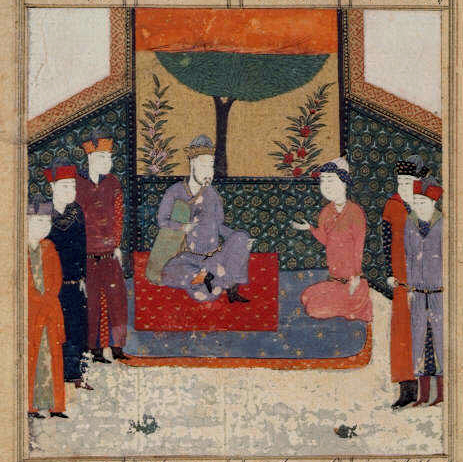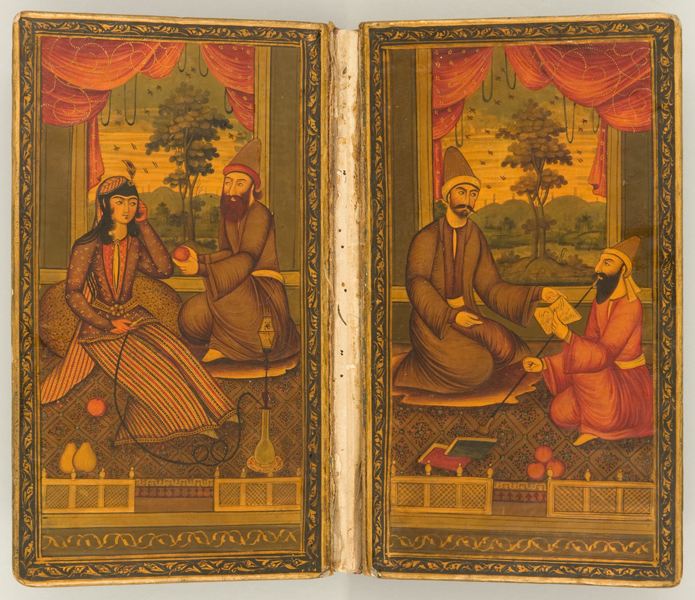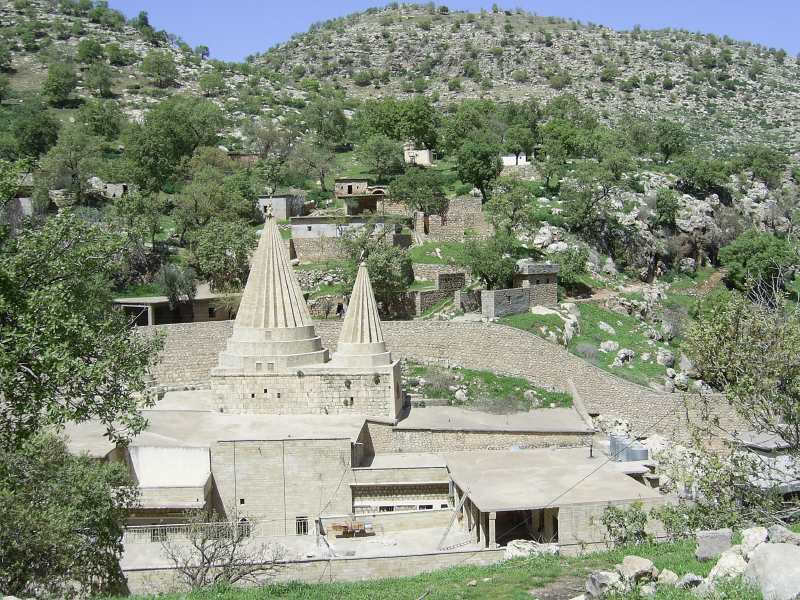|
Hallaj
Mansour al-Hallaj () or Mansour Hallaj () ( 26 March 922) ( Hijri 309 AH) was a Persian HanbaliChristopher Melchert, "The Ḥanābila and the Early Sufis," ''Arabica'', T. 48, Fasc. 3 (2001), p. 352 mystic, poet, and teacher of Sufism. He was best known for his saying, "I am the Truth" ("''Ana'l-Ḥaqq''"), which many saw as a claim to divinity, while others interpreted it as an instance of annihilation of the ego, which allowed God to speak through him. Al-Hallaj gained a wide following as a preacher before he became implicated in power struggles of the Abbasid court and was executed after a long period of confinement on religious and political charges. Although most of his Sufi contemporaries disapproved of his actions, Hallaj later became a major figure in the Sufi tradition. Life Early years Al-Hallaj was born around 858 in Pars Province of the Abbasid Empire to a cotton-carder (''Hallaj'' means "cotton-carder" in Arabic) in an Arabized town called al-Bayḍā'. ... [...More Info...] [...Related Items...] OR: [Wikipedia] [Google] [Baidu] |
Hanbalism
The Hanbali school or Hanbalism is one of the four major schools of Islamic jurisprudence, belonging to the Ahl al-Hadith tradition within Sunni Islam. It is named after and based on the teachings of the 9th-century scholar, jurist and traditionist, Ahmad ibn Hanbal (), and later institutionalized by his students. One who ascribes to the Hanbali school is called a Hanbali (, or ). It adheres to the Athari school of theology and is the smallest out of the four major Sunni schools, the others being the Hanafi, Maliki and Shafi'i schools.Ziauddin Sardar (2014), Mecca: The Sacred City, Bloomsbury, , p. 100 Like the other Sunni schools, it primarily derives sharia from the Quran, hadith and views of Muhammad's companions. In cases where there is no clear answer in the sacred texts of Islam, the Hanbali school does not accept juristic discretion or customs of a community as sound bases to derive Islamic law on their own—methods that the Hanafi and Maliki schools accept. Ha ... [...More Info...] [...Related Items...] OR: [Wikipedia] [Google] [Baidu] |
Fana (Sufism)
Fanaa ( ') in Sufism is the "passing away" or "annihilation" (of the self).Harmless, William. ''Mystics''. New York: Oxford University Press, 2008 Fana means "to die before one dies", a concept highlighted by famous notable Persian mystics such as Rumi. There is controversy around what Fana exactly is, with some Sufis defining it as the absolute annihilation of the human ego before God, whereby the self becomes an instrument of God's plan in the world ( Baqaa).Yaran, Cafer. Muslim religious experiences. Alister Hardy Religious Experience Research Centre, 2004. Other Sufis also interpret it as breaking down of the individual ego and a recognition of the fundamental unity of God, creation, and the individual self. However, persons having entered this enlightened state are said to obtain absolute awareness of an intrinsic unity (Tawhid) between God and all that exists, including the individual themselves. This second interpretation has sometimes been decried by religious and politic ... [...More Info...] [...Related Items...] OR: [Wikipedia] [Google] [Baidu] |
Hanbali School
The Hanbali school or Hanbalism is one of the four major schools of Islamic jurisprudence, belonging to the Ahl al-Hadith tradition within Sunni Islam. It is named after and based on the teachings of the 9th-century scholar, jurist and traditionist, Ahmad ibn Hanbal (), and later institutionalized by his students. One who ascribes to the Hanbali school is called a Hanbali (, or ). It adheres to the Athari school of theology and is the smallest out of the four major Sunni schools, the others being the Hanafi, Maliki and Shafi'i schools.Ziauddin Sardar (2014), Mecca: The Sacred City, Bloomsbury, , p. 100 Like the other Sunni schools, it primarily derives sharia from the Quran, hadith and views of Muhammad's companions. In cases where there is no clear answer in the sacred texts of Islam, the Hanbali school does not accept juristic discretion or customs of a community as sound bases to derive Islamic law on their own—methods that the Hanafi and Maliki schools accept. Hanbal ... [...More Info...] [...Related Items...] OR: [Wikipedia] [Google] [Baidu] |
Sufism
Sufism ( or ) is a mysticism, mystic body of religious practice found within Islam which is characterized by a focus on Islamic Tazkiyah, purification, spirituality, ritualism, and Asceticism#Islam, asceticism. Practitioners of Sufism are referred to as "Sufis" (from , ), and historically typically belonged to "orders" known as (pl. ) — congregations formed around a grand (saint) who would be the last in a Silsilah, chain of successive teachers linking back to Muhammad, with the goal of undergoing (self purification) and the hope of reaching the Maqam (Sufism), spiritual station of . The ultimate aim of Sufis is to seek the pleasure of God by endeavoring to return to their original state of purity and natural disposition, known as . Sufism emerged early on in Islamic history, partly as a reaction against the expansion of the early Umayyad Caliphate (661–750) and mainly under the tutelage of Hasan al-Basri. Although Sufis were opposed to dry legalism, they strictly obs ... [...More Info...] [...Related Items...] OR: [Wikipedia] [Google] [Baidu] |
Ayn Al-Quzat Hamadani
Ayn-al-Qużāt Hamadānī, also spelled Ain-al Quzat Hamedani or ʿAyn-al Qudat Hamadhani (1098–1131) (), was a Persian jurist, mystic, philosopher, poet and mathematician who was executed at the age of 33. Title ''Ayn-al-Qużat'' in Arabic means "the pearl of the judges": ''Ayn'' means the eye, implying something very valuable, and ''Qozat'' is the plural of ''Qadi'', which means judge. Life Ayn al-Quzat was born in Hamedan and his ancestors were of Hamedan judges. His full name is Abu’l-maʿālī ʿabdallāh Bin Abībakr Mohammad Mayānejī (). He was a disciple of Ahmad Ghazali and devoted of Hallaj. He became a famous scholar at early age, and by the time he was thirty he was chosen to be a judge. Along with Abu Hamed Al-Ghazali, he is one of the founders of doctrinal Sufism. According to some accounts, he was briefly a pupil of Omar Khayyam. Upon his return from pilgrimage, Khayyam likely stayed in Hamadan for some time. It is possible that during his stay he beca ... [...More Info...] [...Related Items...] OR: [Wikipedia] [Google] [Baidu] |
Fars Province
Fars Province or Pars Province, also known as Persis or Farsistan (فارسستان), is one of the 31 provinces of Iran. Its capital is the city of Shiraz. Pars province has an area of 122,400 km2 and is located in Iran's southwest, in Regions of Iran, Region 2. It neighbours the provinces of Bushehr province, Bushehr to the west, Hormozgan province, Hormozgan to the south, Kerman province, Kerman and Yazd province, Yazd to the east, Isfahan province, Isfahan to the north, and Kohgiluyeh and Boyer-Ahmad Province, Kohgiluyeh and Boyer-Ahmad to the northwest. Etymology The Persian language, Persian word Pa''rs'' (), derived from the earlier form ''Pârs'' (), which is in turn derived from ' (), the Old Persian name for the Persis region. The names ''Parsa'' and ''Persia'' originate from this region. Pars is the historical homeland of the Persian people. It was the homeland of the Achaemenid Empire, Achaemenid and Sasanian Empire, Sasanian Persian dynasties of Iran, who ... [...More Info...] [...Related Items...] OR: [Wikipedia] [Google] [Baidu] |
Attar Of Nishapur
Faridoddin Abu Hamed Mohammad Attar Nishapuri ( – c. 1221; ), better known by his pen-names Faridoddin () and ʿAttar of Nishapur (, Attar means apothecary), was a poet, theoretician of Sufism, and hagiographer from Nishapur who had an immense and lasting influence on Persian poetry and Sufism. He wrote a collection of lyrical poems and number of long poems in the philosophical tradition of Islamic mysticism, as well as a prose work with biographies and sayings of famous Muslim mystics. '' The Conference of the Birds'', '' Book of the Divine'', and'' Memorial of the Saints'' are among his best known works. Biography Information about Attar's life is scarce and has been mythologised over the centuries. However, Attar was born to a PersianRitter, H. (1986), “Attar”, Encyclopaedia of Islam, New Ed., vol. 1: 751-755. Excerpt: "ATTAR, FARID AL-DIN MUHAMMAD B. IBRAHIM.Persian mystical poet.Farīd al-Dīn ʿAṭṭār, in Encyclopædia Britannica, online edition - accessed Dec ... [...More Info...] [...Related Items...] OR: [Wikipedia] [Google] [Baidu] |
Hafiz Shirazi
(), known by his pen name Hafez ( or 'the keeper'; 1325–1390) or Hafiz, “Ḥāfeẓ” designates someoone who has learned the Qurʾān by heart" also known by his nickname Lisan al-Ghaib ('the tongue of the unseen'), was a Persian lyric poet whose collected works are regarded by many Iranians as one of the highest pinnacles of Persian literature. His works are often found in the homes of Persian speakers, who learn his poems by heart and use them as everyday proverbs and sayings. His life and poems have become the subjects of much analysis, commentary, and interpretation, influencing post-14th century Persian writing more than any other Persian author. Hafez is best known for his '' Divān'', a collection of his surviving poems probably compiled after his death. His works can be described as " antinomian" and with the medieval use of the term "theosophical"; the term "theosophy" in the 13th and 14th centuries was used to indicate mystical work by "authors only inspire ... [...More Info...] [...Related Items...] OR: [Wikipedia] [Google] [Baidu] |
Sachal Sarmast
Sachal Sarmast or Sacho Sarmast (; – 1827), was an 18th and 19th century Sindhi Sufi poet, mystic and philosopher from Daraza (present-day Sindh, Pakistan), regarded as an important figure in the Sindhi-language literature. He is revered throughout Pakistan. Biography Sachal Sarmast was a descendant of Umar and wrote poetry in seven languages: Sindhi, Siraiki, Persian, Urdu, Balochi, Punjabi and Arabic. He lived during the Kalhoro/ Talpur era. He was born in 1152 H (AD 1739) in Daraza, near Ranipur. He was named Abdul Wahab, after his great grandfather. His truthful nature received him the names Sacho, or Sachal which means, "The truth-speaker." He was also named Sachedino, which means "Gifted by The True One." He was also called " Hafiz Darazi", because of his memorization of Quran and love for his home of Daraza. His famous name of Sachal Sarmast means, "Truth-speaker intoxicated in Allah's love". His native home of Shah Daraza was originally a estate for r ... [...More Info...] [...Related Items...] OR: [Wikipedia] [Google] [Baidu] |
Adi Ibn Musafir
Adi ibn Musafir (, ; born 1072–1078, died 1162) was a Sunni Muslim sheikh who founded the Adawiyya order. He is also considered a Yazidi saint. The Yazidis consider him as an avatar of Tawûsî Melek, which means "Peacock Angel". His tomb at Lalish, Iraq is a focal point of Yazidi pilgrimage. He was an Arab from the Umayyad dynasty. He had distant Kurdish heritage as a direct descendant of Marwan II, who was born to a Kurdish mother. Biography Sheikh Adi was born in the 1070s in the village of Bait Far, near Baalbek, in the Beqaa Valley of present-day Lebanon. He hailed from the Umayyad lineage and was a descent from Marwan II, who was born to a Kurdish mother. Sheikh Adi first received Islamic education in the nearby region, likely in Damascus. He then went to Baghdad, where he settled and continued his Islamic education with Sufi circles. He was Shafi'i. In Baghdad, Sheikh Adi was a disciple of Ahmad Ghazali, Abu al-Najib Suhrawardi, and Abdul Qadir Gilani, who all studied ... [...More Info...] [...Related Items...] OR: [Wikipedia] [Google] [Baidu] |
Dhul-Nun Al-Misri
Dhūl-Nūn Abū l-Fayḍ Thawbān b. Ibrāhīm al-Miṣrī (; d. Giza, in 245/859 or 248/862), often referred to as Dhūl-Nūn al-Miṣrī or Zūl-Nūn al-Miṣrī for short, was an early Egyptian Muslim mysticism, mystic and ascetic.Mojaddedi, Jawid, "Dhū l-Nūn Abū l-Fayḍ al-Miṣrī", in: ''Encyclopaedia of Islam, THREE'', Edited by: Kate Fleet, Gudrun Krämer, Denis Matringe, John Nawas, Everett Rowson. Brill Online. His surname "al Misri" means ''"The Egyptian"''. He was born in Akhmim, Upper Egypt in 796 and is said to be of Nubian people, Nubian descent. Dhul-Nun is said to have made some study of the scholasticism, scholastic discipline (academia), disciplines of alchemy, medicine, and Greek philosophy in his early life, before coming under the mentorship of the mystic Saʿdūn of Cairo, who is described in traditional accounts of Dhul-Nun's life as both "his teacher and spiritual director." Celebrated for his legendary wisdom both in his own life and by later Islamic ... [...More Info...] [...Related Items...] OR: [Wikipedia] [Google] [Baidu] |
Islam
Islam is an Abrahamic religions, Abrahamic monotheistic religion based on the Quran, and the teachings of Muhammad. Adherents of Islam are called Muslims, who are estimated to number Islam by country, 2 billion worldwide and are the world's Major religious groups, second-largest religious population after Christians. Muslims believe that Islam is the complete and universal version of a Fitra, primordial faith that was revealed many times through earlier Prophets and messengers in Islam, prophets and messengers, including Adam in Islam, Adam, Noah in Islam, Noah, Abraham in Islam, Abraham, Moses in Islam, Moses, and Jesus in Islam, Jesus. Muslims consider the Quran to be the verbatim word of God in Islam, God and the unaltered, final revelation. Alongside the Quran, Muslims also believe in previous Islamic holy books, revelations, such as the Torah in Islam, Tawrat (the Torah), the Zabur (Psalms), and the Gospel in Islam, Injil (Gospel). They believe that Muhammad in Islam ... [...More Info...] [...Related Items...] OR: [Wikipedia] [Google] [Baidu] |










